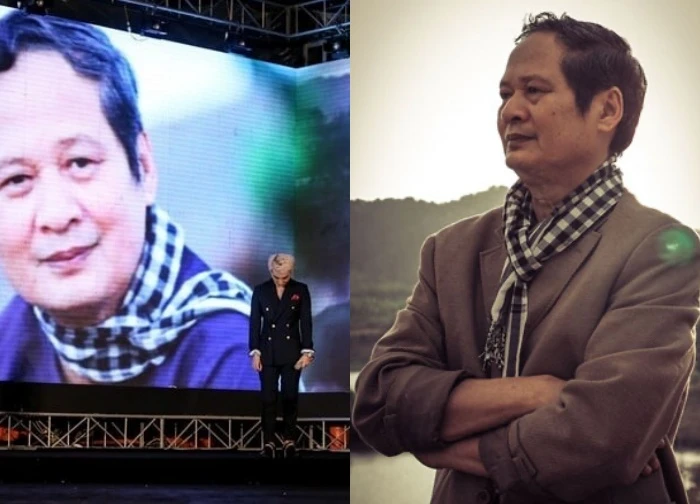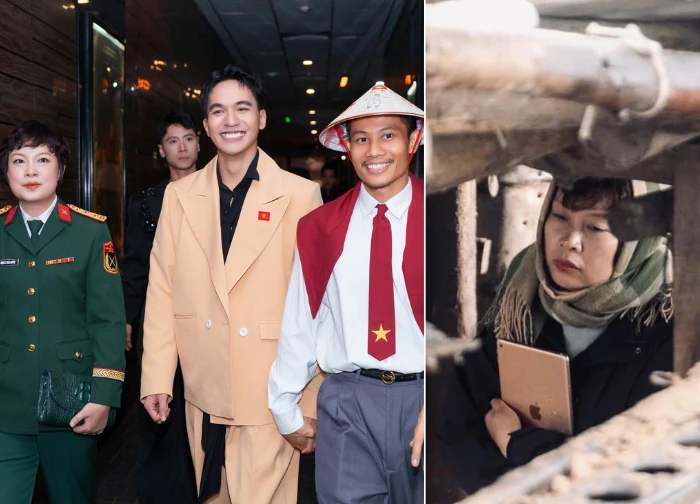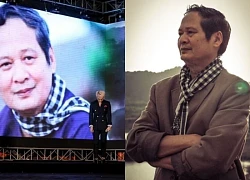Quang Huy: who is Pham Quynh Anh's ex-husband, who worked for Bao Anh for 7 years?

2 | 0 Discuss | Share
An artist known for his ability to "make wings" for poems to become melodies. The late musician Hoang Hiep left behind the songs that have followed through the years.
Musician Hoang Hiep (October 1, 1931 - January 9, 2013) was one of the most representative musicians of Vietnamese revolutionary music, with many works reflecting the changing periods of the Vietnamese nation. in the 20th century.
His real name is Luu Tran Nghiep, the pen name is Luu Nguyen. He was born on October 1, 1931 in My Hiep commune, Cho Moi district, An Giang. He joined the revolution in 1945, joined the Long Xuyen Propaganda Troupe, then transferred to the Long Chau Ha Literature and Arts Association. Hoang Hiep started composing in 1948, but his real life works only appeared in the later stages of composition a few decades later.
He is one of the outstanding poetic composers. He was also the General Secretary of the Ho Chi Minh City Music Association. For his great contributions to the revolutionary cause and the country's music, he was awarded the Ho Chi Minh Prize for literature and art (2nd round, 2000).
When he was a child, his grandmother was a teacher, wanting him to follow the profession of "knocking young children". His grandfather wanted him to follow the profession of traditional medicine to cure diseases and save lives. He became neither a teacher nor a physician. Life gave Hoang Hiep a career in writing songs.
After the Japanese coup d'etat (March 9, 1945), some civil servants and students that day gathered together and organized the Young Pioneers. In addition to the hours of hard practice, they sang patriotic songs. And from here, a patriotic musician Luu Tran Nghiep was attracted by those heroic voices, awakening the musical talent already in him.
"In that day, the canal flowing in front of the house at night was very quiet. A sound of advertising also reached the ears of every house on both sides of the river. And from the same river, many nights resounded the voices of retorts. The singing voices also drifted along the river, filled with many feelings of confiding. Those deep, deep and gentle sounds often made my child's soul unbearable. It caused me anxiety. uneasy," shared musician Hoang Hiep.
At that time in the village, only teacher Nguyen Ngoc Bach was the one who knew how to play the mandoline and was the author of the songs Determined to Go, Heroic Thap Muoi, Itinerant Propaganda.
At a young age, he loved to sing and play the piano at the same time. Back then, a mandoline cost the equivalent of tens of bushels of rice. His family was poor, so he couldn't buy a piano.
"But now I ask my parents for a guitar, even though I know that it is an object that not everyone wants. It is beyond the family's ability. Yet, in order to satisfy my taste, Dad I had to sell all the rice to eat the rest of the family.After that, taking that money, my father also had to crept to Long Xuyen town (at that time was recaptured by the French invaders) to buy and sell rice. bring me an old bandgolin."
In mid-1948, a young man named Luu Tran Nghiep joined the cadre delegation to Long Chau Hau province (At this time, the two provinces of Long Xuyen and Chau Doc were merged and divided into two provinces of Long Chau Tien and Long Chau Hau, taking the Hau river. boundary).
At that time, he had no intention of composing, but before the death of his younger brother Tuyet, Hoang Hiep had to borrow the first melody and lyrics to ease the pain of loss. He created a piece of music without ever having any intention of becoming a songwriter.
"I wasn't equipped with the bare minimum of musical knowledge, so my first songs weren't great. Of course, they just lived with me, then gradually quieted down. After all, I'm not ashamed when I think about it. For one thing, at the age of seventeen, my life was still too young, and my music was almost nothing. Yet I still dared to venture into a path that now, at the time of death, still feels endless."
Young Cho Moi Luu Tran Nghiep is realizing his dream and ambition to become a professional musician. In the last days of 1956, he took a bus from Hanoi to Vinh Linh special zone.
Then from that night, the song "Cau Ho on the banks of Hien Luong" was born (the lyrics of Hoang Hiep and Dang Giao). And from here, the pseudonym Hoang Hiep first appeared and existed in the Vietnamese music industry. The song is widely popularized through the salty and anxious voice of artist Tan Nhan, originally from Quang Tri.
At that time, musician Hoang Hiep was one of the students of Master Tran Kiet Tuong, who was teaching Southern folk singing at the Vietnam Music School.
Around mid-1965, the war of destruction by the American enemy escalated to the north of Thanh Hoa town. Mr. Hoang Hiep's troupe consisted of seven composers, had to take the train from Hanoi to Do Len station, and then started cycling to the provinces of the old Zone IV.
Through this trip, Mr. Hoang Hiep witnessed with his own eyes the will of our army and people, supporting the battlefield for the cause of liberating the South and reunifying the country. And witness an anti-aircraft alarm system. Those are lanterns with blue and red double-glazed glass placed all over the route.
Hoang Hiep has accumulated a living capital like that, so when he "caught" the poem of the poet Chinh Huu, he immediately popularized it. Through the voice of People's Artist Mai Khanh, the song "The Lamp stands guard" reflects the courage and unafraid of sacrifice of the female contingent of young women volunteering on the fire line. The song flew high and far over the Truong Son mountain range with the army to save the country.
During his 20 years living in Hanoi, he traveled to many areas of the fire line, writing more than 100 songs. Many of them are considered love songs, praising the nation's glorious struggle against the US to save the country such as: Red Leaves, Truong Son Dong - Truong Son Tay, The girl with the ropes or the lamp standing guard.. His songs remain with the world, leaving a deep impression on humanity and compassion.
After 1975, musician Hoang Hiep moved to live and compose in Ho Chi Minh City. This is the period when creative thinking is maturing and diverse. In addition to songs, soundtracks, stage, dance, and generally instrumental music with more than 100 works, his other songs also account for a few hundred.
This song is divided into two directions. Inheriting the revolutionary tradition 20 years ago such as: Visiting Uncle Ho's Mausoleum, Remembering Hanoi, Why don't you tell, Fatherland without, Dong Noi, Love poem for marine soldiers, City I love, Rose , Back to the river of childhood... These are songs with heavy love for the homeland and the country and this is one of the two main themes in his composing career.
In 1978, the late musician Hoang Hiep participated in a lecture on the experience of popularizing poetry for a music composition camp in Hau Giang province (now Can Tho city, Soc Trang province and Hau Giang province).
Hoang Hiep's music is very rich and diverse. With hundreds of songs, no two songs are the same, not repeating the creations of the previous song, especially, like no other. His melody and rhythm are both youthful and seasoned, both ethnic and modern.

2 | 0 Discuss | Share

0 | 0 Discuss | Share

5 | 0 Discuss | Share

4 | 0 Discuss | Share

2 | 0 Discuss | Share

1 | 0 Discuss | Share

3 | 0 Discuss | Share

4 | 0 Discuss | Share

5 | 0 Discuss | Share

1 | 0 Discuss | Share

4 | 0 Discuss | Share

3 | 0 Discuss | Share





4 | 0 Discuss | Report